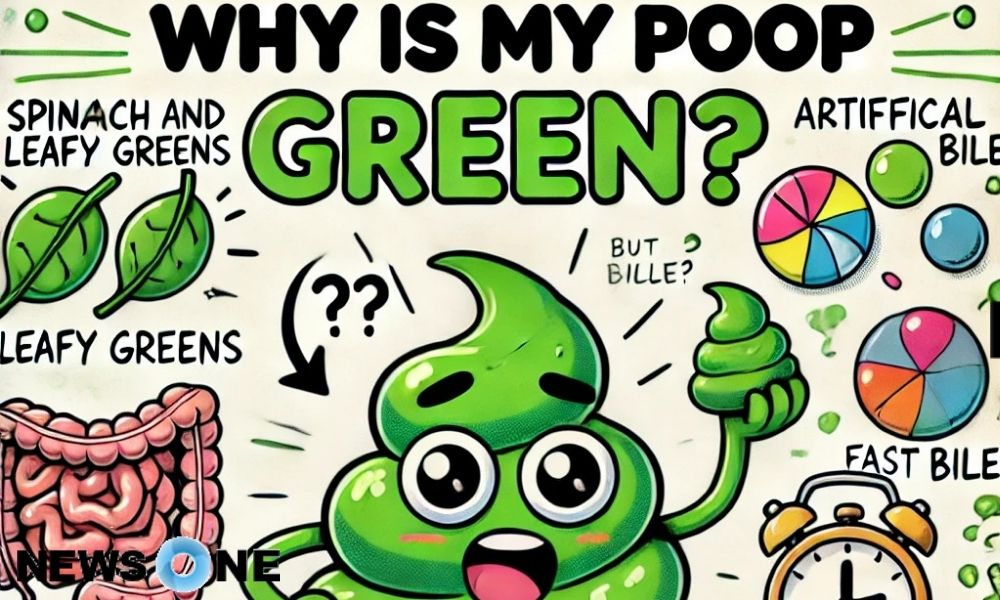Discovering Why Is My Poop Green green, it can be surprising, but it’s often a benign occurrence. While the typical color of feces is brown, various factors can lead to a green hue. This article explores the common causes of green stool, when it might indicate a health concern, and steps you can take to address it.
Why Is My Poop Green?
Several factors can contribute to green-colored feces:
1. Dietary Choices
Consuming large amounts of green leafy vegetables, such as spinach, kale, and broccoli, can impart a green color to your stool due to their high chlorophyll content. Additionally, foods and drinks containing green food coloring, like certain candies, ice pops, and beverages, can also result in green stool.
2. Rapid Transit Through the Digestive Tract
When food moves quickly through the intestines, bile doesn’t have sufficient time to break down completely. Bile is a greenish fluid produced by the liver to aid in digestion. If it isn’t fully processed, it can color the stool green.
3. Medications and Supplements
Certain medications and supplements can affect stool color:
-
Iron supplements: Commonly used to treat anemia, these can darken stool and sometimes give it a greenish tint.
-
Antibiotics: These can disrupt the balance of bacteria in the gut, potentially leading to green stool.
-
Other medications: Some drugs may influence bile production or digestive speed, affecting stool color.
4. Infections
Gastrointestinal infections caused by bacteria (like Salmonella or E. coli), viruses (such as norovirus), or parasites (like Giardia) can lead to diarrhea and rapid transit of stool, resulting in a green color.
5. Medical Conditions
Certain health conditions can cause green stool:
-
Irritable Bowel Syndrome (IBS): This disorder affects bowel habits and can lead to changes in stool color.
-
Inflammatory Bowel Disease (IBD): Conditions like Crohn’s disease or ulcerative colitis can cause rapid transit and inflammation, leading to green stool.
-
Celiac Disease: An autoimmune reaction to gluten that damages the small intestine, affecting digestion and stool color.
When to Seek Medical Attention
While green stool is often harmless, consult a healthcare provider if you experience:
-
Persistent green stool: Lasting more than a few days without an obvious dietary cause.
-
Accompanying symptoms: Such as diarrhea, abdominal pain, fever, or vomiting.
-
Signs of dehydration: Including dizziness, dry mouth, or decreased urination.
-
Presence of blood: If you notice blood in your stool, seek immediate medical attention.
Managing and Preventing Green Stool
To address and prevent green stool:
-
Monitor your diet: Be aware of foods and drinks that may affect stool color.
-
Stay hydrated: Adequate fluid intake aids digestion and bowel movements.
-
Consult with your doctor: Before starting or stopping any medications or supplements.
-
Practice good hygiene: To prevent infections that can affect digestive health.
Conclusion
Green stool can result from various factors, most of which are benign and related to diet or minor digestive changes. However, if the change persists or is accompanied by other concerning symptoms, it’s essential to consult a healthcare professional to rule out underlying conditions.
FAQs
What foods can make my poop green?
Green leafy vegetables like spinach, kale, and broccoli contain high amounts of chlorophyll, which can tint your stool green. Additionally, foods and drinks with artificial green coloring—like candies, ice pops, and sports drinks—are also common culprits.
Is green poop a sign of infection?
It can be. Infections caused by bacteria (e.g., Salmonella, E. coli), viruses, or parasites can speed up digestion, resulting in green-colored diarrhea. If you notice green stool along with symptoms like cramps, fever, or nausea, consult a doctor.
Can stress or anxiety cause green stool?
Yes, stress can affect how your digestive system functions. It may accelerate your gut motility (how fast food moves through the digestive tract), leading to greenish stools due to incomplete bile breakdown.
Should I worry if my baby’s poop is green?
Green poop in babies is typically normal, especially in the first few months. It can result from dietary changes, formula ingredients, or even teething. However, if it’s persistent or accompanied by symptoms like fussiness or diarrhea, check with your pediatrician.
How long does green poop usually last?
If caused by diet or a one-time digestive upset, green poop may last a day or two. If the green color persists beyond three days or is paired with pain, diarrhea, or vomiting, seek medical attention to rule out infections or digestive issues.
Does green poop mean my liver is failing?
Not usually. While bile produced by the liver is green, liver failure tends to cause very pale, clay-colored stools due to lack of bile flow. Green stool is more often related to diet, digestive speed, or minor gut disturbances.


COMMENTS